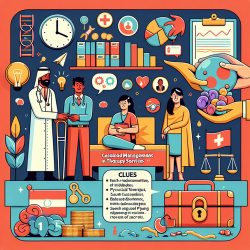Data-Driven Insights for Effective IEP Planning and Meetings
In the realm of special education, the Individualized Education Program (IEP) is a critical tool that guides the educational journey of children with unique needs. As advocates and educators, we are always looking for ways to improve the effectiveness of IEP planning and meetings to ensure that each child receives the best possible support. Leveraging data-driven insights is one powerful strategy that can significantly enhance these processes.
The Role of Data in IEP Planning
Data plays a crucial role in shaping IEPs that are both effective and tailored to the individual needs of children. By analyzing data, educators and therapists can identify patterns, strengths, and areas for improvement, allowing for more precise goal setting and intervention planning.
Key data points to consider include:
- Academic performance metrics
- Behavioral observations
- Therapy progress reports
- Feedback from teachers and parents
These data points can provide a comprehensive picture of a child's abilities and challenges, enabling a more informed and collaborative approach to IEP development.
Enhancing IEP Meetings with Online Therapy Services
Online therapy services, such as those provided by TinyEYE, offer unique advantages in the context of IEP planning and meetings. These services not only facilitate regular and consistent therapy sessions but also generate valuable data that can be used to track progress and adjust strategies as needed.
Some benefits of integrating online therapy data into IEP meetings include:
- Real-time progress monitoring
- Easy access to detailed reports and session notes
- Enhanced communication between therapists, educators, and parents
- Flexible scheduling that accommodates the needs of the child and family
By incorporating this data into IEP meetings, teams can make more informed decisions that align with the child's evolving needs.
Creating Positive Outcomes for Kids
Ultimately, the goal of any IEP is to create positive educational outcomes for children in special education. By embracing a data-driven approach and utilizing online therapy services, we can enhance the quality and effectiveness of IEPs. This ensures that children receive the personalized support they need to thrive academically, socially, and emotionally.
As we continue to advocate for the best interests of children, let us embrace the power of data to drive decisions that lead to meaningful and measurable outcomes. With the right tools and insights, we can transform the IEP process into a more dynamic and impactful experience for all involved.










